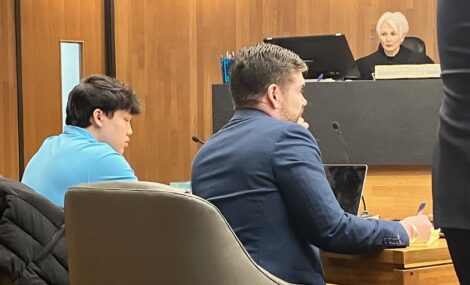Lawrence defense attorney Overstreet: Fairness, transparency missing from Douglas County criminal justice system

photo by: Journal-World file photo; contributed photo
Pictured at right is Lawrence defense attorney Cooper Overstreet. At left is the Douglas County Judicial and Law Enforcement Center.
Mass incarceration, lack of transparency and unfair treatment of minorities and the poor have inspired Lawrence defense attorney Cooper Overstreet to run for Douglas County district attorney, he said.
Overstreet, 32, filed last week to run as a Democrat in the Aug. 4 primary election. He’s currently employed with the Lawrence-based Swain Law Office. He said it’s fair for people to wonder how he would prosecute cases, given his background and his work defending some clients who have been accused of what he said some would call heinous offenses, though he said it’s not his role to judge that.
He thinks it would be a seamless transition because his job is to advocate for his clients to provide a zealous, robust defense, no matter what crime they’re charged with. He said he believes in the right to a fair trial and good defense as a core principle of the Constitution. As a prosecutor, he said his job would be to defend victims and survivors to juries and to allow them to have their stories told.
“That’s all I know how to do,” Overstreet told the Journal-World Monday. “And so my defense of them and my advocacy of them will be no less zealous than my advocacy for my clients right now because that is my sworn duty.”
Asked to name three practices he would want to put into place if elected, Overstreet said he would create an antiracism task force, eliminate the cash bail bond system and engage in “smart prosecuting,” or prosecuting that makes the community safer.
Regarding the former, Overstreet said that police officers are good people who are sworn to serve and protect the community, but racial bias can be unconscious and the system is fundamentally unfair to minorities. An antiracism task force would keep detailed statistics on arrests and interactions with law enforcement to “know where we’re falling down and how we’re treating those who are the most vulnerable in our community.”
He also said he wants to end the “criminalization of poverty” by eliminating cash bail, a system that he says preys on poor people and doesn’t make the community safer.
“We see all too often that we have a lot of good folks in our jail who are there simply because they can’t afford to buy their way out,” Overstreet said, “and our criminal justice system will only function and only be a mechanism for good if it’s not used to punish poverty.”
He said in his practice, he’s seen how the system creates trauma for victims, defendants, attorneys and law enforcement officers, and part of “smart prosecuting” is looking at what training prosecutors are undergoing to make sure they know how to interact with all of those people.
He said he thinks cynicism and “obtaining convictions at all costs” have caused career prosecutors to “fall down on the job” and dehumanize all involved with the system. Overstreet said he’s passionate about interacting with people in a humanizing and compassionate way, and he thinks it’s fundamental for victims to be able to tell their stories without being retraumatized.
Overstreet said mass incarceration and lack of transparency in county government are two other pressing issues facing the system in Douglas County. Mass incarceration is “a systemic and frequent problem in this country, and counties just like Douglas County are the front door” to it, he said. He said he doesn’t believe the county needs a bigger jail, it needs bigger ideas, and with a bigger jail would come pressure to fill it.
He said the district attorney is one of the most powerful elected officials in the county, and that’s why he thinks it’s important to increase transparency in that office and to make decisions with the input of community leaders and mental health professionals.
“You’re endowed with massive amounts of prosecutorial discretion,” Overstreet said. “You make decisions that can affect people’s lives forever and that can fundamentally alter their lives, and so not having a transparent open and accountable leader in our district attorney’s office has been a fundamental issue.”
Overstreet is originally from Augusta, a small town outside of Wichita. He came to Lawrence in 2006 to get his bachelor of arts in history and political science from the University of Kansas, and then attended KU’s law school, graduating in 2014. He lives with his wife, who is a doctoral student in KU’s School of Public Administration, and their 14-month-old daughter.
Incumbent District Attorney Charles Branson, a Democrat, has not had a challenger since he was first elected in 2004. As of Monday, he had not yet announced whether he will run again.
A second candidate, Suzanne Valdez, also filed to run as a Democrat on April 15. For more information about voting and what other offices are on the ballot, visit douglascountyelections.com.
Contact Mackenzie Clark
Have a story idea, news or information to share? Contact public safety reporter Mackenzie Clark:
More 2020 election coverage: Douglas County district attorney race
The Journal-World will cover each candidate who files to run for Douglas County district attorney and their views on key issues as the Aug. 4 primary election draws nearer.
• May 1, 2020: Incumbent Douglas County district attorney: Experience, leadership are needed to create change
• April 28, 2020: District Attorney Charles Branson files for reelection in 2020
• April 21, 2020: KU law professor, prosecutor Valdez: Douglas County district attorney’s office lacks leadership, clear policies
• April 16, 2020: Two Democrats file to run for Douglas County district attorney







